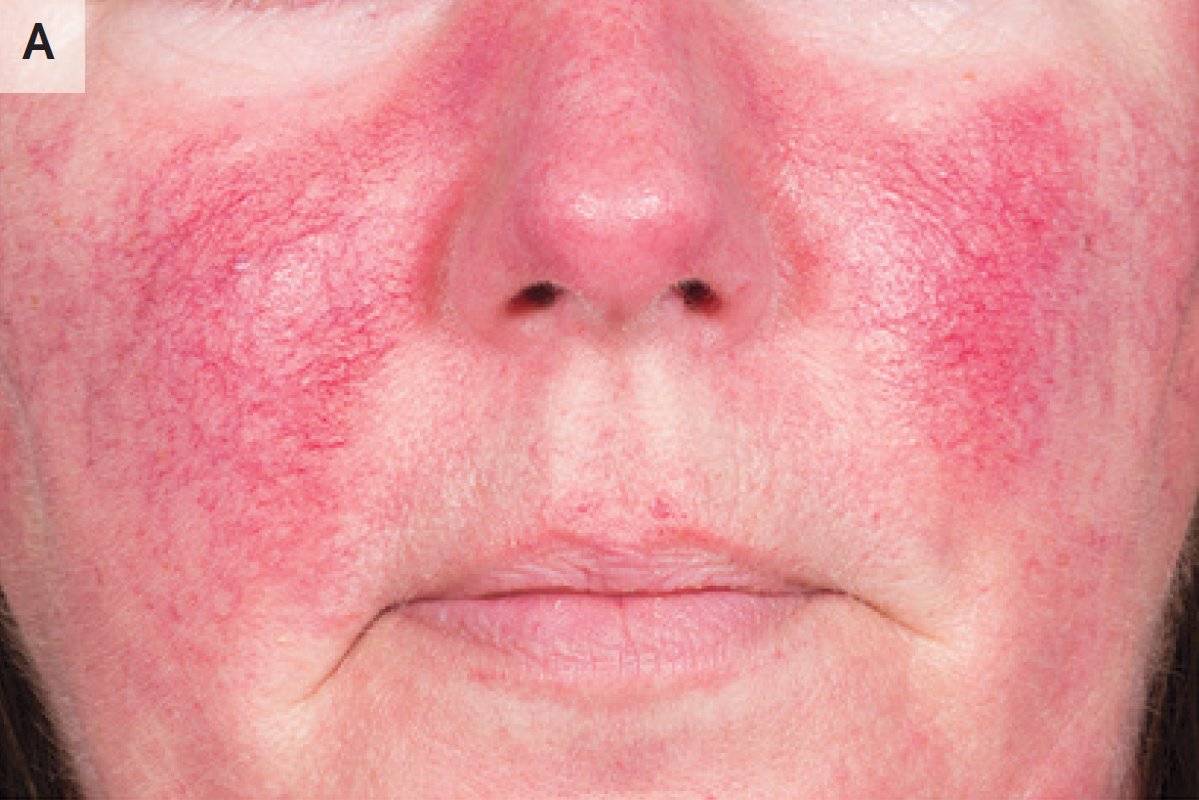Rosacea မျက်နှာသွေးကြောမျှင် ရဲခြင်း
Rosacea is a chronic and relapsing inflammatory skin disorder that primarily involves the central face.
Types of rosacea
(1) erythematotelangiectatic rosacea (ETR)
-facial redness, flushing, and visible blood vessels.
(2) papulopustular rosacea
-acne-like breakouts, affects middle-aged women.
(3) phymatous Rosacea
-skin thickening on nose, affects men and is accompanied by another subtype.
(4) ocular rosacea
-on the eye area.
Clinical features
-facial erythema
-telangiectasias
-inflammatory papules or pustules
-burning or stinging sensations
-rhinophyma
-skin dryness
Pathogenesis
-Overstimulation of innate immune, sensory and autonomic nervous systems
-upregulation of TLR-2 in keratinocytes by Demodex folliculorum
-Activation of peripheral sensory nerve endings (stinging, burning, pain)
-associated with Bacillus oleronius, Staphylococcus epidermidis, Helicobacter pylori,
and Chlamydophila pneumoniae.
Histological changes
-dilated blood vessels, lymphatics, perivascular infiltration of macrophages, mast cells and CD4 & helper T-cells
Risk factor
-age 30 and 50
-fair-skinned
-blond hair and blue eyes
-Celtic or Scandinavian ancestors
Worsening Factor
- eating spicy foods
- eating items – cinnamaldehyde (cinnamon, chocolate, tomatoes, citrus)
- drinking hot coffee or tea
- having the intestinal bacteria H. Pylori
- skin mite (demodex) and the bacterium (Bacillus oleronius)
- the presence of cathelicidin (a protein protects the skin from infection)
Management
There are 4 types of treatment in rosacea: topical, systemic, laser, and light therapies.
(1)Topical therapies
brimonidine tartrate 0.5% gel once daily (for persistence rosacea)
Metronidazole 1% gel twice daily
Oxymetazoline solution 0.05% twice daily
Ivermectin 1% cream once a day
Azelaic acid 15% cream twice a day
Sulphacetamide 10% + sulphur 5% twice a day
Permethrin 5% cream twice a day
Tacrolimus 0.1% ointment twice a day
Pimecrolimus 1% cream once a day
(2)Systemic therapies
Doxycycline 100mg Once or twice daily
Erythromycin 500mg four times/day
Ivermectin 200mcg/kg per day
Metronidazole 200mg twice daily
Isotretinoin 0.5mg/kg daily
(3) Lasers
PDL, KTP laser
(4) Light therapies
IPL
(Note: Vascular laser, and light therapies are mainly used in erythema and telangiectasia)
Emerging therapies
Injectable botulinum toxin
microsecond long-pulsed Nd: YAG laser
topical ivermectin
Complication
Blepharitis
Rosacea keratitis
keratoconjunctivitis sicca
Rosacea fulminans
Vision loss (in ocular type)
Psychological trauma
Products need to avoid
- alcohol
- menthol
- witch hazel
- exfoliating agents
Dr. Aye Min Htoo
(Dermatologist)
(မြန်မာဘာသာ)
Rosacea သည် အဓိကအားဖြင့် မျက်နှာအလယ်ပိုင်းတွင် ပြန်လည်ဖြစ်ပွားနေသော နာတာရှည် ရောင်ရမ်းနေသော အရေပြားရောဂါတစ်ခုဖြစ်သည်။
rosacea အမျိုးအစားများ
(၁) Erythematotelangiectatic rosacea (ETR)၊
- မျက်နှာနီခြင်း၊ နီခြင်းနှင့် မြင်နိုင်သော သွေးကြောများ။
(၂) Papulopustular rosacea
- ဝက်ခြံကဲ့သို့ ကွဲထွက်ခြင်းများသည် သက်လတ်ပိုင်း အမျိုးသမီးများကို ထိခိုက်စေပါသည်။
(၃) Phymatous Rosacea
-နှာခေါင်းတွင် အရေပြားထူလာကာ အမျိုးသားများကို ထိခိုက်စေပြီး အခြားအမျိုးအစားခွဲများဖြင့် လိုက်ပါသွားပါသည်။
(၄) Ocular rosacea
- မျက်လုံးဧရိယာ မျက်ကြည်လွှာ
လက်တွေ့ပါရှိပါတယ်။
- မျက်နှာတွင် ယားယံခြင်း။
-telangiectasias
- ရောင်ရမ်းသော papules သို့မဟုတ် pustules
- ပူလောင်ခြင်း သို့မဟုတ် စူးရှသောခံစားမှုများ
-rhinophyma
- အရေပြားခြောက်သွေ့ခြင်း။
ရောဂါဖြစ်ပွားမှု
- မွေးရာပါ ကိုယ်ခံအား၊ အာရုံခံနှင့် အလိုအလျောက် အာရုံကြောစနစ်များကို လွန်ကဲစေခြင်း။
- Demodex folliculorum အားဖြင့် keratinocytes တွင် TLR-2 ကို ထိန်းညှိပေးခြင်း
- အာရုံခံအာရုံကြောများ (တွန့်ခြင်း၊ ပူလောင်ခြင်း၊ နာကျင်ခြင်း)၊
- Bacillus oleronius၊ Staphylococcus epidermidis၊ Helicobacter pylori၊
နှင့် Chlamydophila pneumoniae။
သမိုင်းဆိုင်ရာပြောင်းလဲမှုများ
- သွေးကြောများချဲ့ခြင်း၊ lymphatics၊ macrophages များ၏ perivascular infiltration၊ mast cells နှင့် CD4 & helper T-cells
အန္တရာယ်အချက်
- အသက် 30 နှင့် 50
- အသားအရည် ဖြူစင်သည်။
- ရွှေရောင်ဆံပင်နှင့် မျက်လုံးပြာ
-Celtic သို့မဟုတ် Scandinavian ဘိုးဘေးများ
ပိုဆိုးစေသောအချက်
စပ်သောအစားအစာများစားခြင်း။
စားသုံးနိုင်သောပစ္စည်းများ - cinnamaldehyde (သစ်ကြံပိုးခေါက်၊ ချောကလက်၊ ခရမ်းချဉ်သီး၊ လိမ္မော်သီး)
ကော်ဖီပူပူ ဒါမှမဟုတ် လက်ဖက်ရည်သောက်ပါ။
အူလမ်းကြောင်းတွင် H. Pylori ဘက်တီးရီးယားရှိခြင်း။
အရေပြားပိုးမွှား (demodex) နှင့် ဘက်တီးရီးယား (Bacillus oleronius)၊
cathelicidin ပါဝင်မှု (ပရိုတင်းဓာတ်သည် အရေပြားကို ကူးစက်ခြင်းမှ ကာကွယ်ပေးသည်)၊စီမံခန့်ခွဲမှု
rosacea တွင် ကုသမှု 4 မျိုး ရှိသည်- လိမ်းဆေး၊ စနစ်ကျသော၊ လေဆာနှင့် အလင်းကုထုံးများ။
(၁) လိမ်းဆေးများ
brimonidine tartrate 0.5% ဂျယ်နေ့စဉ် တစ်ကြိမ် (မြဲမြံအောင် rosacea အတွက်)
Metronidazole 1% ဂျယ် တနေ့ နှစ်ကြိမ်
Oxymetazoline ဖြေရှင်းချက် 0.05% တစ်နေ့ နှစ်ကြိမ်
Ivermectin 1% ခရင်မ် တစ်နေ့ တစ်ကြိမ်
Azelaic acid 15% ခရင်မ် တစ်နေ့ နှစ်ကြိမ်
Sulphacetamide 10% + sulfur 5% တနေ့ နှစ်ကြိမ်
Permethrin 5% ခရင်မ် တစ်နေ့ နှစ်ကြိမ်
Tacrolimus 0.1% လိမ်းဆေး တစ်နေ့ နှစ်ကြိမ်
Pimecrolimus 1% ခရင်မ် တစ်နေ့ တစ်ကြိမ်
(၂) စနစ်ကျသော ကုထုံးများ
Doxycycline 100mg တနေ့ တစ်ကြိမ် သို့မဟုတ် နှစ်ကြိမ်
Erythromycin 500mg တနေ့ လေးကြိမ်
Ivermectin 200mcg/kg တနေ့
Metronidazole 200mg တနေ့ နှစ်ကြိမ်
Isotretinoin 0.5mg/kgနေ့စဉ်
(၃) လေဆာရောင်ခြည်
PDL၊ KTP လေဆာ
(၄) အလင်းကုထုံး
IPL
(မှတ်ချက်- သွေးကြောလေဆာနှင့် အလင်းကုထုံးများကို erythema နှင့် telangiectasia တို့တွင် အဓိကအသုံးပြုသည်)
ပေါ်ပေါက်လာသောကုထုံးများ
botulinum toxin ထိုးဆေး
microsecond long-pulsed Nd: YAG လေဆာ
လိမ်းဆေး ivermectin
နောက်ဆက်တွဲဆိုးကျိုး
Blepharitis
Rosacea keratitis
keratoconjunctivitis sicca
Rosacea fulminans
အမြင်အာရုံဆုံးရှုံးခြင်း (မျက်စိအမျိုးအစား)
စိတ်ပိုင်းဆိုင်ရာဒဏ်ရာ
ထုတ်ကုန်များကို ရှောင်ရှားရန် လိုအပ်သည်။


Write Reviews
Leave a Comment
No Comments & Reviews